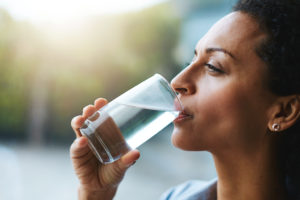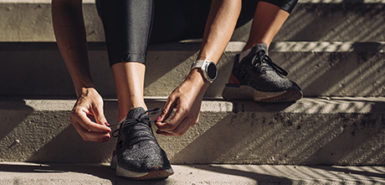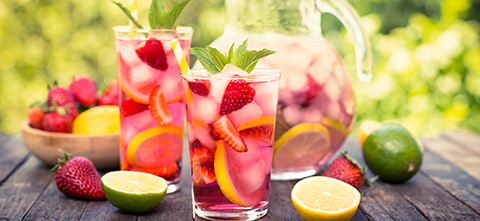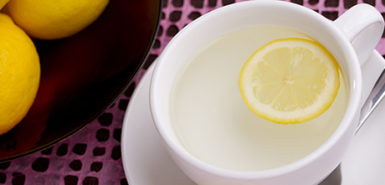
It’s a sunny summer day. You’re hot and thirsty.
What do you reach for—a glass of cold water? Lemonade? Soda? Beer?
Water will always be the best choice, Spectrum Health dietitian Holly Dykstra said. But there are still plenty of ways to enjoy your favorite beverages all summer long, while keeping proper hydration and good health top of mind.
Q: How much water should I drink? Do I need more in the summer?
There’s no one-size-fits-all answer. It’s important to pay attention to your body to ensure you’re getting enough water, Dykstra said.
A standard guideline is 64 ounces of water a day, or 8 cups. Usually, it’s about 8 to 11 cups for women and 11 to 14 for men, she said.
“Everybody has different needs,” Dykstra said. “So some people might do well with 6 or 7 cups and some might need 12 or 13. It’s helpful to pay attention to your own thirst and urine and stools.”
The goal is clear urine. Dark yellow means you need more fluids. Also, you should have easy-to-pass stools.
And yes, you likely do need more water in the summer.
“Generally, if you’re outside more in the sun and more active, you will need to drink extra fluids and be conscious of that,” Dykstra said.
It’s also important to recognize that our thirst reflex declines as we get older.
“As we age, our risk of dehydration is higher because we are less able to understand when we are thirsty or not,” Dykstra said. “So you need to be more conscious of how much you are drinking, even if you’re not thirsty, as you age.”
Q: How can I make water more appealing?
If you’re tired of drinking plain water—and let’s be honest, it can get boring—you can always liven it up in healthy ways.
One of Dykstra’s favorites: Brew a large batch of fruit-flavored tea and chill it to make iced tea.
She also suggests making your own flavor-infused water at home. Add lemon or lime wedges, mint, basil, lavender, berries or cucumbers. You can use a countertop pitcher or water dispenser, or even purchase a water bottle with an infuser inside.
“You can make so many different combinations,” Dykstra said. “This can reduce the blandness of water, but without giving you any added sugars or artificial sweeteners.”
Another tip: Add a small amount of juice or coconut water to your glass of water. While it adds sugar, it’s a nice change once in a while, she said.
An attractive presentation—a fun water bottle or a user-friendly water dispenser at home—can also encourage more water consumption.
Q: Is it OK to have soda?
There are some important things to keep in mind if you prefer soda once in a while.
First, if you’re drinking regular soda, you’re consuming a lot of added sugar.
“We really want to watch the added sugars,” Dykstra said. “We should just consider that to be the same as eating dessert.”
And while diet soda does not have calories or carbohydrates, it does contain artificial sweeteners.
“There’s still a lot of research that needs to be done on artificial sweeteners, but some research shows that it’s not beneficial for us if we consume it in large quantities,” Dykstra said. “Although it doesn’t have calories, you should still consider it a treat.”
Research has shown that artificial sweeteners can contribute to greater risk of glucose intolerance and may negatively impact the balance in your gut microbiome.
“Artificial sweeteners, like sucralose and aspartame, are much sweeter than regular sugar. If you consume diet soda on a regular basis, your taste buds may get used to this really sweet flavor, and it may cause you to crave sweet foods more often,” Dykstra said.
As with all indulgences, there’s a place for all types of food and drinks. Just be mindful about choosing indulgent items as an occasional treat—and recognize they’re not a nutritional choice.
Q: Any added risks to drinking alcohol in the summer?
Particularly in the summer, it’s important to remember that alcohol has a diuretic effect on your body. This means it can dehydrate you—not hydrate, Dykstra said. Combined with the extra heat, that could put you at risk for severe dehydration.
“I recommend an extra glass of water for every alcoholic beverage you drink,” she said. “If you are drinking, especially in the heat of the sun, you need to be really conscious of the fact that you can put yourself at risk if you are not careful. Be sure to get some water in as well.”
In addition to the risk of dehydration, Dykstra urges everyone to drink responsibly, any time of year. She urges limiting alcohol, spacing out drinks and making sure not to drink on an empty stomach, which can cause dehydration symptoms to come on more quickly.
Q: Do I need electrolyte or sports drinks in the summer?
Most people don’t need these drinks, Dykstra said. In fact, these drinks can do more harm than good for many people because of the sodium and added sugars or, in the diet versions, artificial sweeteners.
Sports drinks might be helpful for athletes who are very active or people who work outdoors in the heat all day, because they’re sweating heavily, she said.
“That might be where these drinks are helpful, but otherwise people do not need them,” she said. “These drinks are advertised as nutritious options, but they usually have a lot of added sugar and sodium.”
So when you’re reaching for a summer beverage, give yourself some variety—but keep your choices healthy most of the time, Dykstra said.
“Don’t forget that water is usually the best.”
 /a>
/a>
 /a>
/a>
 /a>
/a>